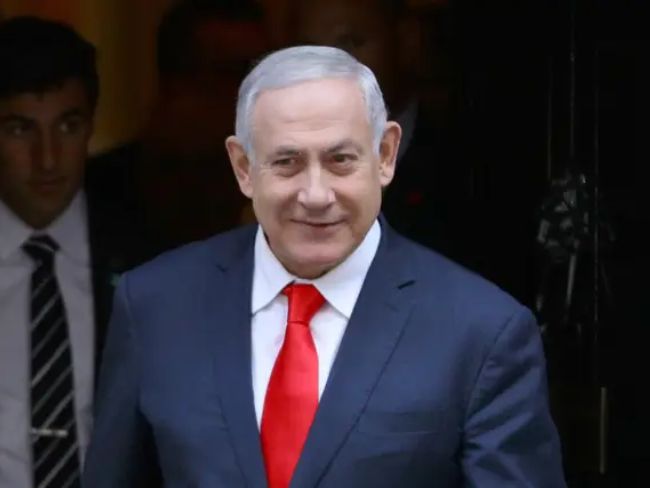Benjamin Netanyahu Introduction
Benjamin Netanyahu is the longest-serving Prime Minister of Israel, and he continues to attract both supporters and opponents worldwide. Born in 1949, he rose through the ranks of a commando unit before leaving military service at a high rank to pursue degrees at MIT. He later ventured into the world of diplomacy and politics, where he soon proved himself to be a firm advocate for Israel’s security and a political survivor. But his opponents criticized him as corrupt, and this led to protests and also cast doubts on his regard for democratic values. Consequently, he is one of the most controversial figures in modern Israel’s history, and his life is characterized by both his strength and the debate surrounding it.
Quick Facts:
- Full Name: Benjamin “Bibi” Netanyahu
- Date of Birth: October 21, 1949
- Place of Birth: Tel Aviv, Israel
- Nationality: Israeli
- Political Party: Likud
- Profession: Politician, Diplomat, Soldier
- Major Role: Prime Minister of Israel (1996–1999, 2009–2021, 2022–present)
- Education: Massachusetts Institute of Technology (MIT), Harvard University (studies), MIT Sloan School of Management
- Military Service: Israel Defense Forces, Sayeret Matkal (special forces)
- Spouse: Sara Netanyahu
- Known For: Longest-serving Prime Minister of Israel, strong stance on security, and major political controversies
Early Life and Education
Benjamin Netanyahu was born on October 21, 1949, in Tel Aviv, Israel, to Benzion Netanyahu, a historian, and Tzila Segal. He grew up in Jerusalem but also spent part of his childhood in the United States. In 1967, he joined the Israel Defense Forces and served as both a soldier and a commander in the elite special forces unit, Sayeret Matkal, until 1972. After completing his military service, he returned to the United States to pursue higher education. He studied architecture at the Massachusetts Institute of Technology (MIT) and later earned a Master of Management degree from the MIT Sloan School.
Military Career
In 1967, Benjamin Netanyahu joined the Israel Defense Forces (IDF) serving the elite special forces unit Sayeret Matkal. He was a soldier and team leader that took part in various high-risk missions, which made him famous as a brave and a leader. Netanyahu participated in the work of intelligence and commando units, including secret raids, which was his preoccupation with the idea of national security since childhood. His political later defense and security policies were influenced by his military service as being hardliner.
Political Career Beginnings
In 1978, Benjamin Netanyahu went back to Israel, where he established the Yonatan Netanyahu Anti-Terror Institute. Early in the 1980s, he served in Washington at the Israeli Embassy as Deputy Chief of Mission, and subsequently as Ambassador to the UN (1984-1988). He got into the Knesset in 1988 as a member of the Likud Party and worked as a deputy minister. By 1993, he emerged as a winner of leadership of the Likud Party. This triumph put him in the role of Israel as Leader of the Opposition, and it set the stage for his first term as Israel’s Prime Minister.
Benjamin Netanyahu Personal Life
Benjamin Netanyahu was a three-time married person. His marriage to Miriam Weizmann ended a divorce, and his second marriage to Fleur Cates ended in separation. He married a psychologist named Sara Ben-Artzi in 1991, and they have two sons, Yair and Avner. Netanyahu speaks both Hebrew and English, and half of his childhood he spent in the USA. The loss of his elder brother, Jonathan Netanyahu, in the Entebbe raid in 1976 had a profound effect on his personal perspective and political visio
Political Rise
- Was elected the youngest prime minister of Israel, concerned with security and peace negotiations.
- Coming back to the power with a right-wing coalition, which emphasised the nuclear threat and economy of Iran.
- Still hardline policy towards the Palestinians, however, coalition wrangles led to early elections.
- Larger settlements, adopted the Nation-State Law, and tightened the U.S. relations.
- Negotiated the Abraham Accords, however, corruption scandals and a political stalemate undermined him.
- Also had a comeback with the most rightwing coalition and forced judicial reforms despite the protests.

Benjamin Netanyahu Prime Ministership
First Term (1996–1999):
Netanyahu is the youngest prime minister in Israel. He put more emphasis on security, he signed the Wye River Memorandum with the Palestinians, yet he was unsuccessful in peace negotiations and internal conflicts in his coalition, which lost power in 1999.
Second Term (2009–2013):
He came back ten years later, at the head of a right-wing coalition. He concentrated on Iranian nuclear threat, economic stability and settlement expansion making a strong impression of a powerful security leader.
Third Term (2013–2015):
Netanyahu continued his hardline stance on Palestinians and strongly opposed the Iran nuclear deal. However, disputes inside his coalition led to early elections.
Fourth Term (2015–2019):
He pushed the controversial Nation-State Law, expanded settlements, and maintained close ties with the U.S., while corruption probes started to cloud his leadership.
Fifth Term (2019–2021):
Netanyahu oversaw the historic Abraham Accords, normalizing ties with several Arab states. Yet, corruption trials and repeated elections weakened his position, and he lost office in 2021.
Sixth Term (2022–Present):
He returned in 2022, forming the most right-wing coalition in Israel’s history. His push for judicial reforms sparked massive protests, showing both his political resilience and divisive legacy
Israeli-Palestinian Conflict
Netanyahu has positioned himself as an icon of power among his supporters and a target among critics by always portraying Israeli security as something they should not compromise on. He enlarged settlements, made Israel more defensively protected and demanded that Palestine recognize Israel as a Jewish state. He took part in peace talks, but in the process his terms usually complicated the process as he believed that a compromise must not jeopardize the existence of the nation. His proponents consider him as the defender of the sovereignty of Israel whereas his critics claim that his policies further created divisions and not initiated peace. After all, the legacy of Netanyahu.
Benjamin Netanyahu Controversies
- Faced multiple corruption charges, including bribery, fraud, and breach of trust.
- Accused of undermining democratic norms, particularly regarding judicial independence.
- Criticized for settlement expansion in the West Bank, fueling international disputes.
- His coalition politics and policies sparked widespread protests domestically.
- Opponents argue his long tenure polarized Israeli society and deepened political divisions.
Relations with Foreign Leaders
Netanyahu was closely tied to the United States, particularly during the presidencies of George W. Bush, Donald Trump, and, to a lesser extent, Joe Biden, during which he secured military assistance and diplomatic support. Moreover, he established ties with Arab states through the Abraham Accords, as he normalized relations with the UAE, Bahrain, Sudan, and Morocco. Simultaneously, he frequently disputed with European leaders on questions regarding settlements and the Iran nuclear deal. On the whole, his style was characterized by diplomacy and tough security policies because, in his opinion, the survival of Israel required strong ties in the international arena.
Conclusion
Benjamin Netanyahu is one of the most popular and scandalous Israeli leaders. He has influenced the security, foreign policy, and domestic affairs of this country through his military service in high ranks and several terms as prime minister. His supporters celebrate his strength, vision in strategies, and protection of national interests, whereas critics mention the corruption charges, polarizing policies, and unsuccessful peace negotiations. After all, the question of his legacy is complicated because it is both strong and controversial and also a leader in a country that still struggles with deep-seated issues.
You May Also Like:





Comments are closed